 BBC
BBCWith a record 20 world championship medals and 11 Olympic medals, Allyson Felix is the most decorated female athlete of all time.
In recent years, she has not been content to just be a trailblazer, becoming a fierce advocate for women, especially in the area of maternal health rights.
With violence against female athletes overshadowing sport this year, Felix told BBC 100 Women that she was very concerned about the safety of female athletes in some parts of the world.
“There needs to be a change in culture. Something is wrong and that worries me,” he says.
Felix says she was devastated when she heard the news of the death of Olympic athlete Rebecca Cheptegei, who was set on fire by her boyfriend in Kenya earlier this year.
The mother of two was the third athlete to die in Kenya in the past three years.
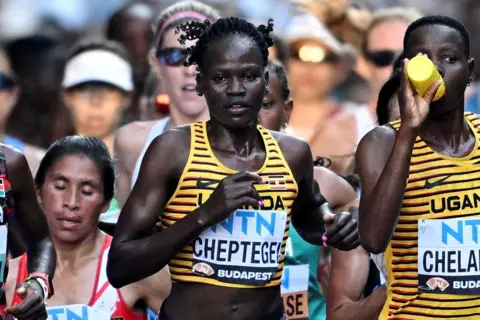 Reuters
ReutersFelix says it’s a “real problem” that she will prioritize as a recently elected member of the IOC Athletics Commission, the body that represents athletes within the Olympic movement.
“The consequences have to be serious, but I think it has to be more than that,” he says. “I think we need to rally around the sports community and come together.”
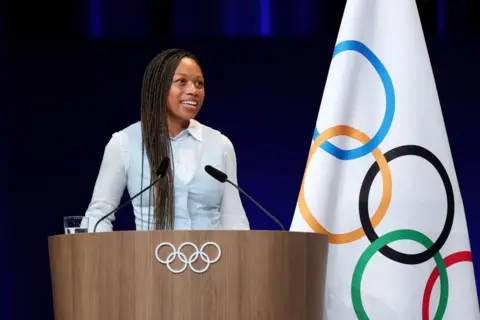 Getty Images
Getty Images“You shouldn’t be an afterthought”
The American runner, who will retire in 2022, is one of the women on the BBC’s 100 Women list, which annually names 100 inspirational and influential women around the world. This year, the list focuses on the theme of “resilience,” which in Felix’s case is particularly apt.
In 2018, when she was 32 weeks pregnant, she was diagnosed with severe preeclampsia and underwent an emergency caesarean section. Her daughter, Camryn, spent some time in the neonatal intensive care unit.
Next year, va powerful commentary for The New York TimesFelix clashed with her then-sponsor, Nike, over her maternity pay, revealing Nike’s threat to take a 70% pay cut if motherhood affected her future athletic performance.
Three months later, Nike changed its stance and new contracts guaranteed the athlete’s pay and bonuses for 18 months around the pregnancy. Three other sportswear companies have also introduced maternity protection for sponsored athletes.
In her article, Felix wrote that pregnancy is the “kiss of death” in her industry.
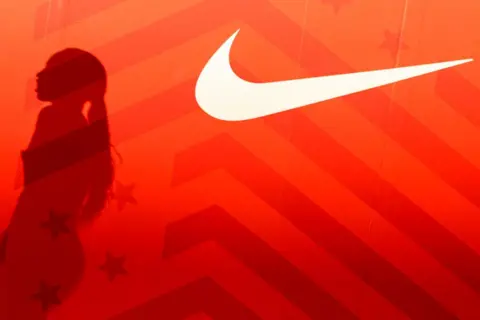 Getty Images
Getty Images“I was scared of what the consequences would be. I was scared of how it would be received. It just wasn’t in my nature. And so it was really hard to be vulnerable,” she says.
The decision to speak out could have ended her career, but less than a year after giving birth, Felix made history when she won her 12th gold medal in the 4 x 400m medley relay in Doha, surpassing Usain Bolt’s record .
Felix has since carved a new path for himself.
Two years after parting ways with Nike, in 2021 she and her brother Wes founded a footwear company that sold sports-inspired footwear modeled after women’s feet.
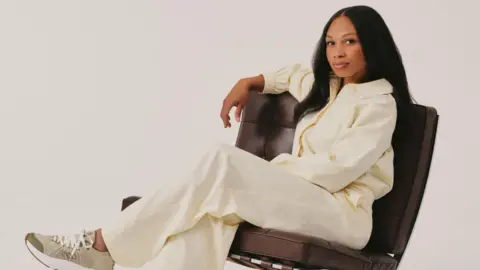 Elizabeth Carababas
Elizabeth CarababasThis year, the mother of two played a key role in ensuring that there was a children’s room in the Olympic Village – the first available to athletes competing at the Games.
He considers this a great victory, but says more needs to be done.
“When you come back, it’s a big hurdle to get back into the sport and find out you’re traveling the world and who’s taking care of your baby,” she says.
“To be able to take something off that plate, that’s what I want to do.”
In the future, she wants sponsors to change the way they represent female athletes.
Her latest venture, Always Alpha, is a management company dedicated exclusively to women’s sports, which she says is part of her legacy.
“Traditionally, women were put in the same box (as men). I don’t think women should be an afterthought, especially when we think about business and how strategy is created.
“Throughout my negotiations with Nike, I’ve been dealing with an all-male team basically telling me how I’m going to bounce back after giving birth. Now there are more women who have seats at the table and have power, but I still have a long way to go .”
Part of her role with the Athletes’ Commission will be to listen to other athletes and advocate on their behalf.
“If you decide to have a baby in the middle of your career, then do it,” she says. “We work very hard to support women who make that choice.”
Implicit bias
Felix, who gave birth to her second child this year – son Trey – has also been very vocal in highlighting the disproportionately high risk of maternal mortality among black women in the US.
This year, Melinda Gates awarded her a $20 million grant to improve maternal health outcomes. She did not rule out using the money to support global projects.
“Most of my experience is in the US and in my own communities, but I’m actively talking to organizations around the world,” he says.
According to the Centers for Disease Control and Prevention (CDC), black women in the US are three times more likely to die from a pregnancy-related cause than white women.
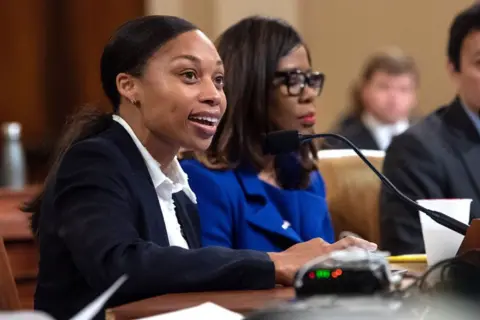 Getty Images
Getty Images“There is still an implicit bias in our health care system and we don’t see the numbers changing fast enough,” he says.
Felix believes that women are too often ignored when they report concerns to their doctors.
“I hear they can’t hear them,” he says. “It’s not going to turn around if we don’t educate our health workers.”
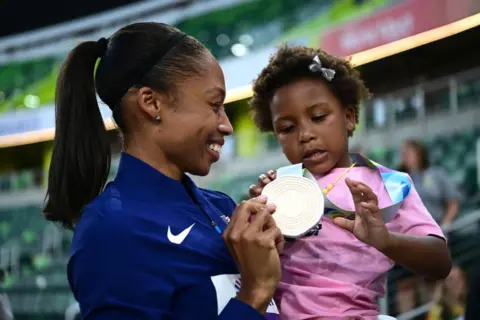 Getty Images
Getty ImagesFelix says her daughter makes the topic of women’s health “very personal.”
With abortion rights back in the spotlight after the US presidential election, she believes women should have a choice.
“You know, as parents, we’ve seen so many things change in the world that it’s a scary time,” she says.
“I think about her and her generation and the things we might be left without.”
But she hopes her advocacy will inspire her children for years to come.
“I want them to always know that you should have an impact, that you should help others, that you should stand up for what you believe in.”
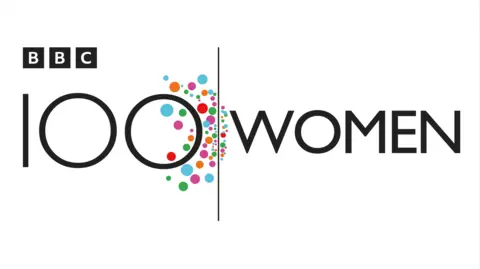
BBC 100 Women names 100 inspiring and influential women around the world each year. Follow BBC 100 Women on Instagram and Facebook. Join the conversation with #BBC100Women.






